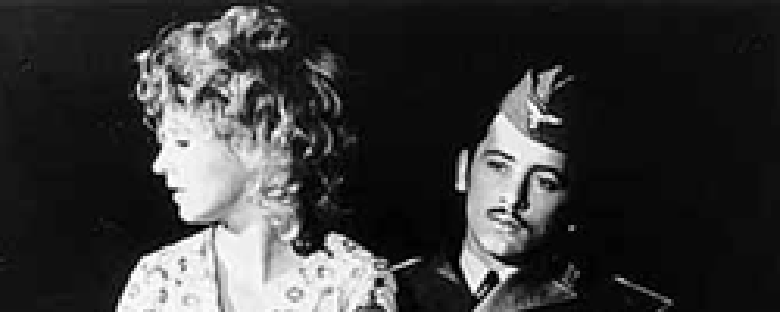Reviews
Pioniere in Ingolstadt
Rainer Werner Fassbinder
Germany, 1971
Credits
Review by Matt Bailey
Posted on 11 July 2004
Source Fantoma DVD
Adapted from the 1929 play by Marieluise Fleisser, Rainer Werner Fassbinder’s film concerns what happens to the inhabitants of the titular town when a group of young army recruits arrives to build a bridge. Two friends, both housemaids, allow themselves to be used by the recruits, albeit in different ways. Alma (Irm Hermann) throws herself at the men sexually, eventually becoming an outright whore, having sex with men mostly for the money but sometimes out of pity. Berta (Hanna Schygulla) throws herself at one particular recruit emotionally and cannot understand why he continues to see her yet treats her so coldly. Soon, the recruits finish the bridge and depart as suddenly as they came, leaving the women and the rest of the town worse for the wear.
The initial impression one gets from the title is that this film will be full of women in calico dresses living hardscrabble lives in covered wagons. Apparently, “pioneers” meant something different in pre-WWII Germany. These pioneers appear to be young Nazi recruits (you can tell by the swastikas on their caps), but very little is made of this in the film except for the blond sergeant of the group who is willing to expound on his superiority to anyone who asks (and to even more who don’t). Oddly, the film could be taking place at any time in the first seventy years of the 20th century. The recruits (one of them black) wear Nazi uniforms, but Alma’s hairstyle and dresses are clearly from the 1940s, while Berta’s afro and minidresses are decidedly from the 1960s. This could be carelessness, intentional, or the mark of a severely low-budget film, but it doesn’t make any difference. The film just takes place in Fassbinderland — a place that is always affected by current events, but you’re never quite sure how current those events are. Fassbinder’s films seem to exist in a realm that is somehow cut off from the rest of the world, yet still somehow part of it, as if it were encased under glass.
The plot of the film is simple. Somebody once said that there were only two plots in literature — a hero goes on a journey or a stranger comes to town. This film takes the latter as its model and treats the event almost like a chemistry experiment or a recipe. Take two young women hungry for excitement, add a troop of drunken, carousing army recruits, and shake well. What could easily be the basis of a wild teen flick, in Fassbinder’s hands, turns into a coldly calculated examination of the impossibility (or at least the improbability) of love. Alma believes love doesn’t exist or, if it does, it’s not coming her way anytime soon, so she takes advantage of every opportunity laid (pun intended) at her feet. Berta wants desperately to believe in love, but she’ll never find it where she’s looking. We’re not given the satisfaction of seeing how these women’s lives turn out once the recruits take off, but one gets the impression that we’re better off not knowing.
Overall, this is a minor work from Fassbinder, yet at the same time characteristic of the themes of his work as a whole. It doesn’t quite hit the emotional highs and lows of films like Ali: Fear Eats the Soul, The Marriage of Maria Braun, or Veronika Voss, doesn’t quite have the formal rigor of films like Effi Briest or Katzelmacher, and doesn’t possess the flat-out kookiness of Whity, but everything you think about when you think of Fassbinder is in there somewhere.
We don’t do comments anymore, but you may contact us here or find us on Twitter or Facebook.



